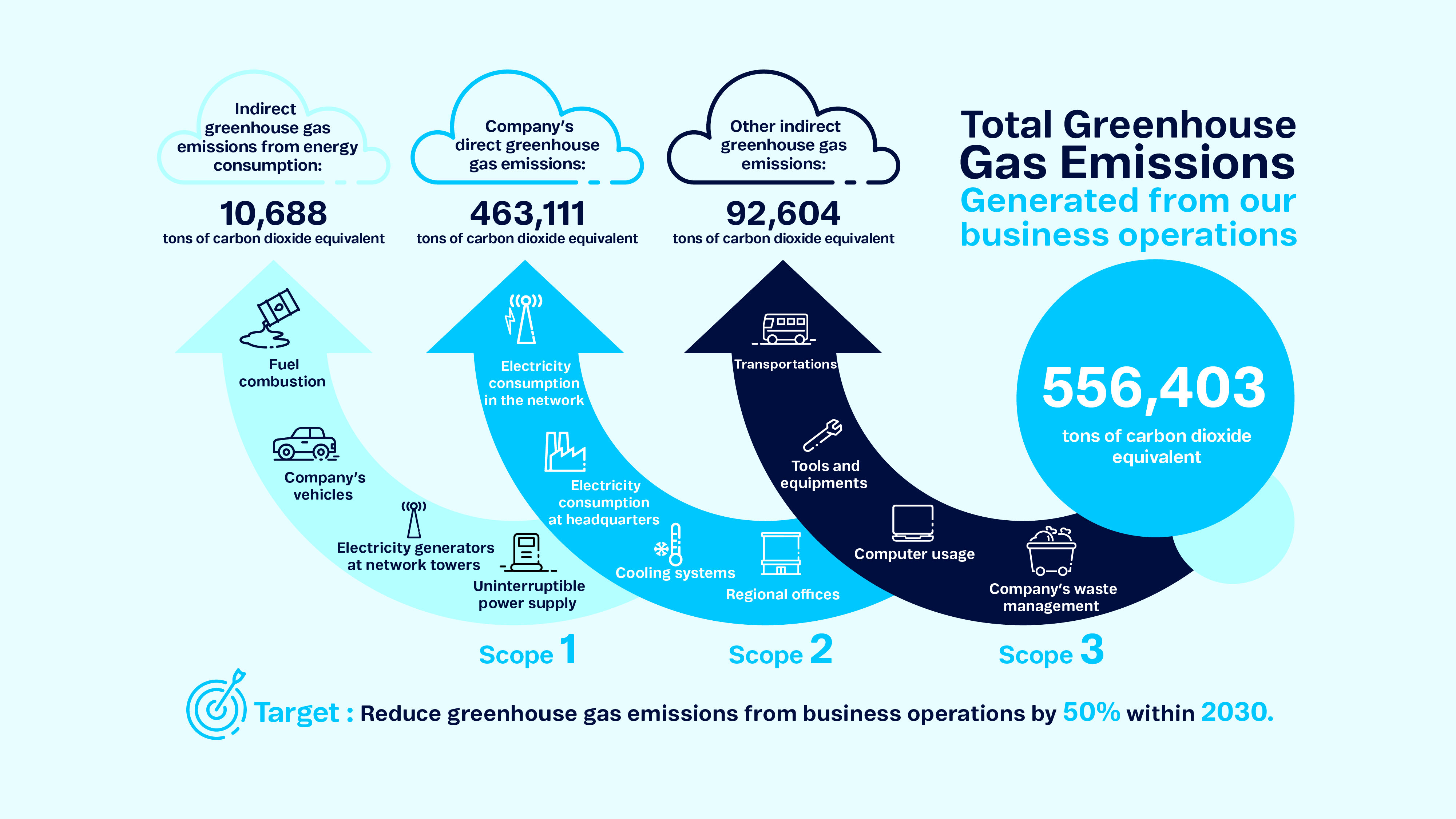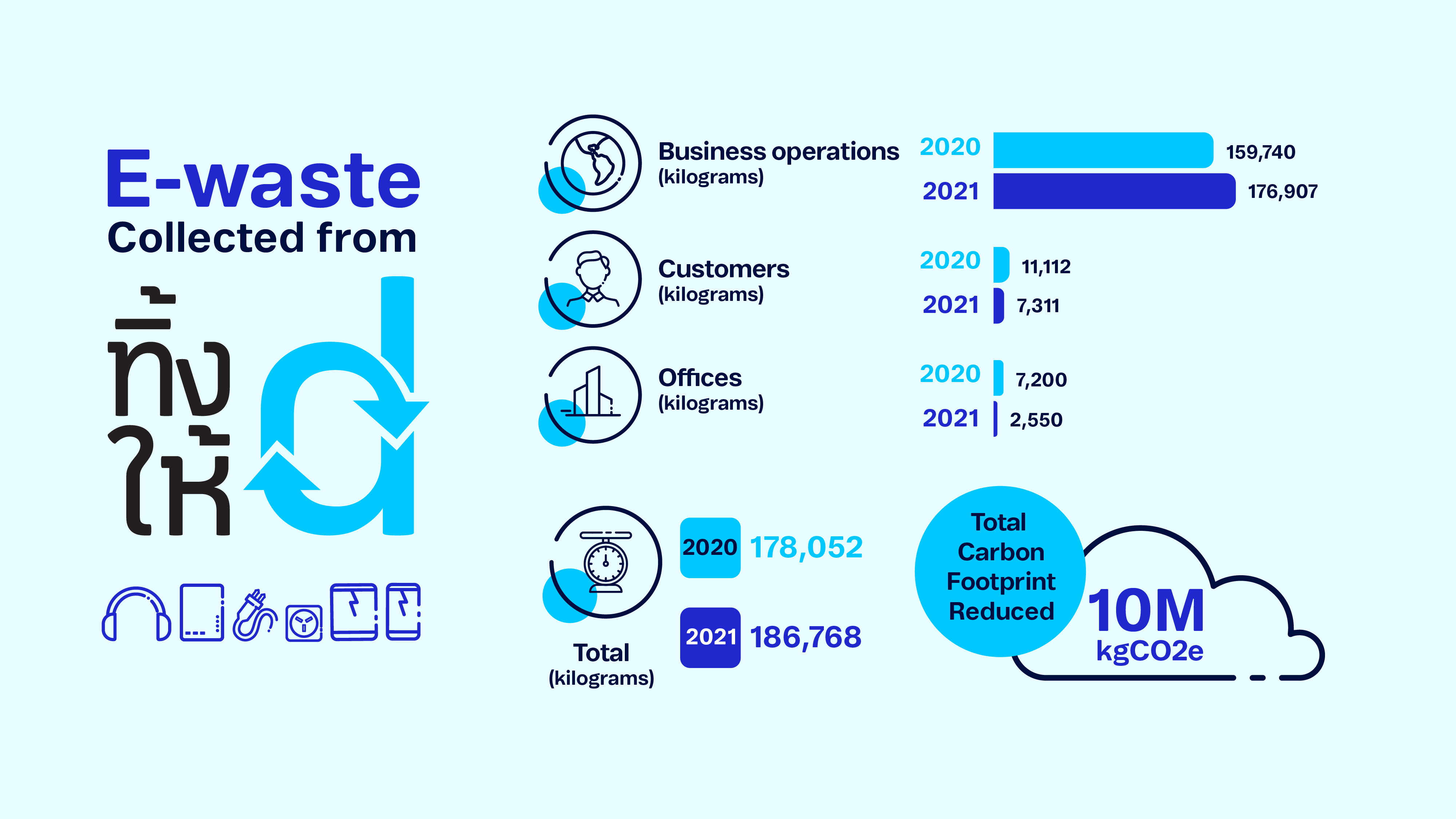Being the Change
COVID-19 has further increased Thailand’s mobile connectivity needs, with dtac customers’ average data usage reaching 20 GB per person. This will augment energy consumption across the network, which currently accounts for more than 97 percent of the energy needs for dtac’s business operations.
In response, dtac has committed to cutting its greenhouse gas emissions in half by 2030 through renewable energy and by boosting energy efficiency across the network infrastructure and data centers. Moreover, dtac is committed to achieving zero landfill disposal when it comes to its solid and electronic waste by 2022.
B&W screen can save energy by 20%. Switch now, you are playing a small role in slowing climate change!
Accelerated Digital Transformation and the Growth of Energy Consumption
Did you know that Thailand sees an average annual network expansion of up to 7%? This is higher than the global average of 4.2% per year, according to data collected in 2020.
The telecommunications industry accounts for up to 2-3% of the world's energy consumption. Though this may seem like a small number, there is a strong likelihood that this percentage will continue to grow. Undeniably, the sector plays an important role in greenhouse gas emissions, and with new technology developments come a natural increase in power usage.
Source : GSMA
Thais purchase the most smartphones in the ASEAN region — a total of 20.9 million devices.
With the pandemic, we have seen a continuous increase in electronic devices per household — these may include computers, tablets, and mobile phones. And due to changing consumption behaviors, such as work-from-home or remote learning, Thai consumers are now using an average of five devices per person. As of now, there are more than 142 mobile phone numbers listed, 45 million of which are used with IT devices and 97 million with smartphones.
"We all have a role to play, whether as consumers, enterprises, or authorities. Enterprises have a bigger role to play as part of shaping societies. They also have a choice to make for sustainability. It is a choice to move from a dirty to a cleaner economy. And that transition needs a lot of strategic focus, commitment, and investment.”
Navneet Nayan, Head of Technology Strategy & Service Management at dtac
"We all have a role to play, whether as consumers, enterprises, or authorities. Enterprises have a bigger role to play as part of shaping societies. They also have a choice to make for sustainability. It is a choice to move from a dirty to a cleaner economy. And that transition needs a lot of strategic focus, commitment, and investment.”
dtac is tackling climate change across three focus areas to improve the efficiency of energy consumption and reduce greenhouse gas emissions across our networks. These focus areas are:
1. Leveraging the power of analytics to identify inefficiencies, wastage, and any potential improvements, leading to lower consumption and better financial results.
2. Targeted investments in renewable power and installation of cooling techniques and solutions.
3. Working with policymakers, regulators, and industry players to jointly address opportunities for renewable energy sourcing and emission reduction.
Read more: dtacblog.co

“Transition into clean energy is certainly worthwhile, in terms of investments, as well as social and environmental benefits. Solar-panel prices are decreasing while related technologies are getting better. We’ve already reached a tipping point for the transition towards solar power"
Chumnan Theamnooch, Coverage and Infrastructure Planning team, dtac
“Transition into clean energy is certainly worthwhile, in terms of investments, as well as social and environmental benefits. Solar-panel prices are decreasing while related technologies are getting better. We’ve already reached a tipping point for the transition towards solar power"
In 2021, dtac had already installed solar panels for more than 25 cell sites in areas such as Phuket, Surat Thani’s Pha Ngan Island, Phang Nga’s Similan Island, Chiang Mai, and Chanthaburi. In 2022, we aim to set up 500 more solar-powered cell sites. We are also studying a co-investment model for the expansion of solar-powered cell sites through collaborations with partners, namely providers of signal-transmission devices and data centers.
Read more dtacblog.co




